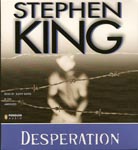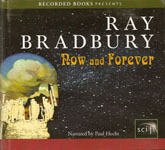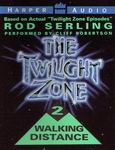
 Desperation
Desperation
By Stephen King; Read by Kathy Bates
8 CDs – 9 hours – [ABRIDGED]
Publisher: Penguin Audio
Published: 2009 (reissue from 1996)
ISBN: 9780143143895
Themes: / Horror / Possession / Small town / Spirits / God / Writers /
I had high hopes for Stephen King’s Desperation (small band of people held captive in a demon-haunted mining town, breaking loose to battle possessed corpses, scorpions, and wolves—what’s not to like?), but alas, it failed to deliver on its intriguing premise. I’d give it an above average 3 ½ out of 5 stars. It contains some interesting ideas and is worth a read, but is not in the class of King’s best works.
Desperation contains some effective action sequences and the usual dollop of King-ian gross-out horror scenes, though there’s little actual frightening stuff in here. The book walks a hazy middle ground between a straight-up horror story and an examination of the nature of faith and the personage of God, and at least (for me) never really succeeds with either objective.
The basic problem I had with Desperation is that it contains no memorable or even particularly likeable personalities. The closest we get to a main character is John Edward Marinville, a pretty obvious stand-in for King himself (Johnny is a graying popular writer and member of the Baby Boomer generation whose career is starting to flag, and embarks on a cross-country motorcycle trip to attempt to find inspiration for his next novel. Which is apparently identical to how King arrived at the idea for Desperation). But after his introduction Johnny gets placed on the back burner as King juggles a bunch of other introductions, and we don’t learn what makes him tick until the book is nearly through.
I will give King some benefit of the doubt as the Penguin audio book I listened to for this review was abridged, and King’s original text is cruelly slashed. It’s apparent that some character development was left on the Penguin cutting room floor. The audio version is (somewhat) saved by narrator Kathy Bates of Misery fame, who does a fine job as the reader.
The rest of the characters are your standard cast of interchangables, save for David Carver, an 11-year-old boy who is able to communicate directly with God. King was certainly ambitious with Desperation: Like he did with The Stand, King inserts God directly into this book. He also spends some time exploring the nature of God through David’s struggle to reconcile a being that is supposedly all-knowing and all good, but is also cruel and demands borderline unbearable sacrifices of his worshipers here on earth. In the cruelest act of all, King writes, sometimes God lets His broken and suffering people live.
Opposing our band of heroes is the demon Tak, an evil spirit penned up in a 19th century mine—the China Pit—located on the outskirts of the small, secluded town of Desperation, Nevada. Tak is freed when a modern-day mining company accidentally unearths the ancient shaft. There’s an old legend in Desperation that a group of Chinese miners were buried alive in the mine after the shaft caved in, and the white miners outside sealed them in, alive, after deciding a rescue was too risky. In another weakness of the book, it’s not apparent whether the Chinese had stumbled onto Tak, or whether he was summoned by the curses of the dying, vengeful workers trapped inside.
Tak has the ability to inhabit the bodies of his victims, and he uses his hosts to embark on a murderous rampage that wipes out nearly the entire population of Desperation. Last of all Tak takes possession of Collie Entragian, the hulking town sheriff, and using his body and his cruiser rides up and down Highway 50 snaring unwitting hostages one by one.
Entragian/Tak locks his hostages in the Desperation town jail for use as human hosts (demon-possessed bodies wear out rather quickly and gruesomely, we learn). But spurred on by a vision from God, David manages to squirm through the bars of his cell and free the group. The rest of the book follows David as he accepts God’s command to defeat Tak. But first he has to overcome the group’s skepticism of God and his own shaken faith, which is cruelly tested again and again.
The middle of the book is a rather uninspired, drawn-out sequence of the group holed up in Desperation’s movie theatre. The book ends in a final showdown at the China Pit as the survivors attempt to seal the shaft. I wanted to see more of the inside of the mine, which seemed to have lots of potential as a set-piece, but the book ends rather abruptly.
I’d be remiss if I didn’t mention a scene in which Johnny/King shouts out, “God forgive me, I hate critics!” before detonating a cache of explosives. I have to believe that King wrote the scene with a big grin on his face, and I certainly got a laugh out of it, even though I’m likely among the critics for which King has little use.
Posted by Brian Murphy


